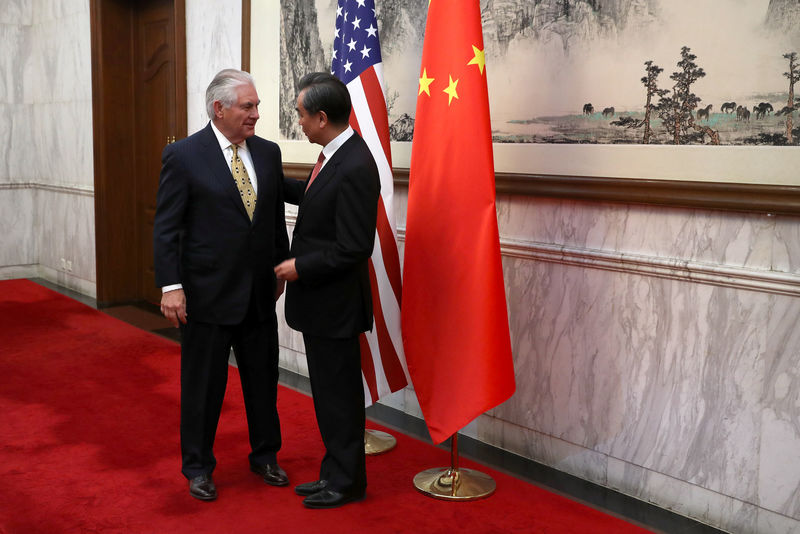By Ben Blanchard and Yeganeh Torbati
BEIJING (Reuters) - U.S. Secretary of State Rex Tillerson arrived in China on Saturday for what is likely to be a prickly visit, with Beijing angry at being told to rein in nuclear-armed North Korea and Washington repeatedly demanding it do more to control Pyongyang.
China is also expected to voice its strong opposition to this month's deployment of a sophisticated U.S. missile defense system in South Korea.
Tillerson issued the Trump administration's starkest warning yet to North Korea on Friday, saying that a military response would be "on the table" if Pyongyang took action to threaten South Korean and U.S. forces.
He was speaking in South Korea, the second leg of his first visit to Asia since taking office. He was previously in Japan.
In Beijing, he may raise the prospect of imposing "secondary sanctions" on Chinese banks and other firms doing business with North Korea in defiance of sanctions, a U.S. official told Reuters in Washington, speaking on condition of anonymity.
U.S. President Donald Trump said in a tweet on Friday that North Korea was "behaving very badly" and accused China, Pyongyang's neighbor and only major ally, of doing little to resolve the crisis over the North's weapons programs.
The state-run Chinese tabloid the Global Times said on Saturday that it was in China's interests to stop North Korea's nuclear ambitions but to suggest China cut the country off completely was ridiculous as it would be fraught with danger.
"Once there is chaos in North Korea, it would first bring disaster to China. I'm sorry, but the United States and South Korea don't have the right to demand this of China," it said in an editorial.
By not taking China's suggestion that the United States and South Korea should stop military drills in return for North Korea stopping its tests, and then all sides returning to talks, Washington was showing a level of inflexibility that was "really disappointing", it added.
The official Xinhua news agency noted Tillerson's comments in Seoul that military options against Pyongyang were on the table.
"However, there is nothing new in this approach. These same tactics were once used by Trump's predecessor George W. Bush, and failed," it said.
Tillerson however is also expected to firm up a trip by Chinese President Xi Jinping to the United States next month for his first summit with Trump, and could choose to tone down any differences between the world's largest economies, at least for now.
XI MEETING ON SUNDAY
A former oil executive with no prior diplomatic experience, Tillerson will meet China's two top diplomats on Saturday and Xi on Sunday.
On Friday, Chinese Foreign Ministry spokeswoman Hua Chunying reiterated that talks were the best way to resolve the problems of the Korean peninsula.
"As a close neighbor of the peninsula, China has even more reason than any other country to care about the situation," she told a briefing.
North Korea has conducted two nuclear tests and a series of missile launches since the beginning of last year.
Last week, it launched four more ballistic missiles and is working to develop nuclear-tipped missiles that can reach the United States.
Washington has been pressing Beijing to do more to stop North Korea's nuclear and missile programs.
China has called for a dual track approach, urging North Korea to suspend its tests and the United States and South Korea to suspend military drills, so both sides can return to talks.
Beijing has been irritated by suggestions it has not been doing enough, with the official People's Daily on Friday denouncing what it said was Washington and Seoul's "blind worship" of sanctions and pressure.
"There has been a narrative in the West suggesting that China holds the key to the North Korea nuclear issue. That is a misguided statement," said Wang Dong, associate professor of international studies at China's elite Peking University.
"The bottom line is that the DPRK is not a puppet regime. We do not control them, and we have strongly opposed North Korea's development of nuclear weapons from the very beginning," he said, referring to the North's official name, the Democratic People's Republic of Korea.
China has also been infuriated by the deployment of the THAAD, or Terminal High Altitude Area Defense, missile defense system in South Korea, which it says will both harm China's own security and do nothing to ease tensions.
China says the system's powerful radar will extend into the country's northeast and potentially track Chinese missile launches, and maybe even intercept them. Russia also opposes THAAD, for the same reasons.
There are other tricky issues too, including the self-ruled island of Taiwan which China claims as its own.

The Trump administration is crafting a big new arms package for Taiwan that could include advanced rocket systems and anti-ship missiles to defend against China, U.S. officials said, a deal sure to anger Beijing.